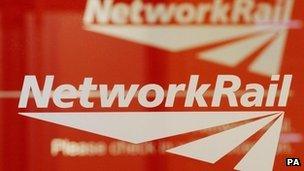Network Rail apologises over East Coast delays
- Published

The Office of Rail Regulation recently decided Network Rail was not doing its job properly
Network Rail has been forced to apologise to customers on one of the country's busiest train lines after a summer of frustration and big delays.
Punctuality on the East Coast Main Line slumped to 83.4% between mid-August and mid-September, following problems with overhead power lines in three areas.
That punctuality figure is much lower than any other line over the period.
If the infrastructure firm fails to hit its 92% target by spring, it faces a fine of about £75m from the regulator.
It's Network Rail's job to keep the track, signals and lines working.
Now, on the face of it, one bad month of train delays might not seem like such a big deal. But there is a much bigger picture here, and it means trouble is brewing for Network Rail.
Punctuality on intercity trains is one of the most stubborn problems on our railways, with the bulk of delays attributed to Network Rail. Some of it's not their fault. It could be freakish weather or people - and even animals - straying on to the lines.
But a lot of it is their fault. Now, and I am happy to broadcast this promise, I will eat a train seat if they hit that 92% target. In fact, insiders tell me that for intercity trains an 88% figure is much more likely.
The pressure is beginning to pile up on Network Rail over the way it maintains all those thousands of miles of track, signals and overhead power lines. The rail regulator recently waded in, with a report saying the company had taken its eye off the ball over repairs.
The Office of Rail Regulation singled out problems with drainage across the system, poor maintenance planning and a failure from the company to understand exactly what they own and exactly what state it's in.
I can also tell you, by the way, that behind the scenes East Coast are pulling their hair out over Network Rail's poor maintenance of their line, which crucially links London, via Peterborough to Yorkshire and Edinburgh.
The wiring was put in in the 80s, somewhat "on the cheap", according to lots of engineers I talk to, and those chickens are now coming home to roost.
Public v private
There is a plan to spend £247m upgrading the East Coast line over the next five-year spending period, to improve capacity and journey times. Sounds like a lot?
Compare that to the £9bn it took to upgrade the parallel West Coast Main Line over the past decade, and they still haven't finished the job.
Talking of the West Coast Main Line, Virgin Trains is actually suing Network Rail at the moment, claiming that poor repairs have led to delays that are putting people off using their services. I understand that the final compensation bill could hover around the £10-15m mark.
The East Coast line is big news at the moment, as politicians fight over its future (Labour will be talking about it at their conference next week).
It's been in public hands since 2009, after National Express's disastrous attempt to run it ended after just two years, because they couldn't make it pay. The government's determined to see it back in private hands before the next election, so determined in fact that it's pushed it up the franchising queue to make sure it happens.
Labour want it kept in public hands, claiming that the state-owned company running it (the snappily titled Directly Operated Railways, or DOR), is generating much better value for money than all the private companies running other lines. The shadow transport secretary Maria Eagle will tell her conference that DOR should be allowed to bid for the new franchise, and for other train franchises as well.
It raises the prospect of a Labour government letting chunks of the railway freewheel slowly back into public hands, something the unions have been campaigning for for years. But it still falls well short of the N-word - nationalisation.
In the end, all customers will care about is how well the service gets them from A to B. After a summer of problems, I'm not sure an apology from Network Rail will do much to obviate their frustration. So let's ask them, shall we. Tweet me @richardwestcott, external with your thoughts if you use the line.
- Published13 September 2013
- Published5 September 2013
- Published12 June 2013
- Published6 June 2013